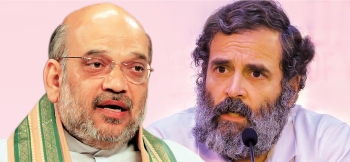
.png) Dr Suresh Mathew
Dr Suresh Mathew

In the late forties when the question of the reconstruction of Somnath temple came up, Gandhiji told Sardar Patel and others that he was in favour of rebuilding the temple, but it should not be done with government funds. It has to be undertaken wholly with private funds, Gandhiji was emphatic about it. When the time for its inauguration came, President Rajendra Prasad was invited to do that honour. He consulted Prime Minister Jawaharlal Nehru who dissuaded the former from it. Nehru told the President: “My dear Rajendra Babu, I confess that I do not like the idea of your associating yourself with a spectacular opening of the Somnath Temple. This is not merely visiting a temple, which can certainly be done by you or anyone else, but rather participating in a significant function which unfortunately has a number of implications.” Nehru was highlighting the principle of separating state form religion. It is another matter that the President later attended the inauguration of the temple.
Cut to the present era. Addressing a public meeting in Tripura, which is going to polls in a month or two, Union Home Minister Amit Shah announced that the Ram temple at Ayodhya would be opened on January 1 next year. It is appalling that the announcement came neither from the Shri Ram Janmabhoomi Teerth Kshetra, which is overseeing the temple construction, nor any religious leader associated with it. It is equally important to recall that Prime Minister Narendra Modi was the master of ceremonies and the official yajmaan during the Bhumi Pujan ceremony of the temple in 2020. The Modi government has travelled miles and miles from the Nehru government which had the principle of separation of state from religion as one of its core agenda. With the BJP, apparently under the tutelage of the Sangh Parivar, coming to power, such niceties and distinctions have vanished into thin air.
Juxtapose this ostentatious and brazen politicization of religion with Congress leader Rahul Gandhi’s unambiguous announcement that Bharat Jodo Yatra is not for political gain, but it is a ‘tapasya’ meant to fight hate, fear, disharmony and division of the society on caste and religious lines. Religion and its associated rituals make the ‘highway’ to people’s hearts. It is the easiest and surest method to exploit the ordinary mortals and manoeuvre the gullible public to garner votes. Rahul Gandhi’s Tapasya may or may not bring in political dividends. But, at a time when the country is in the thick of religious and caste upheavals; when religious fundamentalists and fanatics clamour for a Hindu Rashtra; when the main religious minorities are threatened with annihilation, the yatra for unity and harmony sends out its message loud and clear.
The negativity of politicising religion has to be countered by the positivity of Rahul Gandhi’s call for tapasya. The country needs politicians who desist from cashing in on the naivety of people. As the BJP enters the final year of its second term in the Centre, tide seems to have turned against it. The party is frantically searching for a vote-catching ‘achievement’ that would catapult it to power again. What better means than ‘temple politics’ to garner votes. But such short-cuts to power would do colossal damage to the country. Rahul’s Tapasya route, on the other hand, would be the ideal path to keep the nation united.